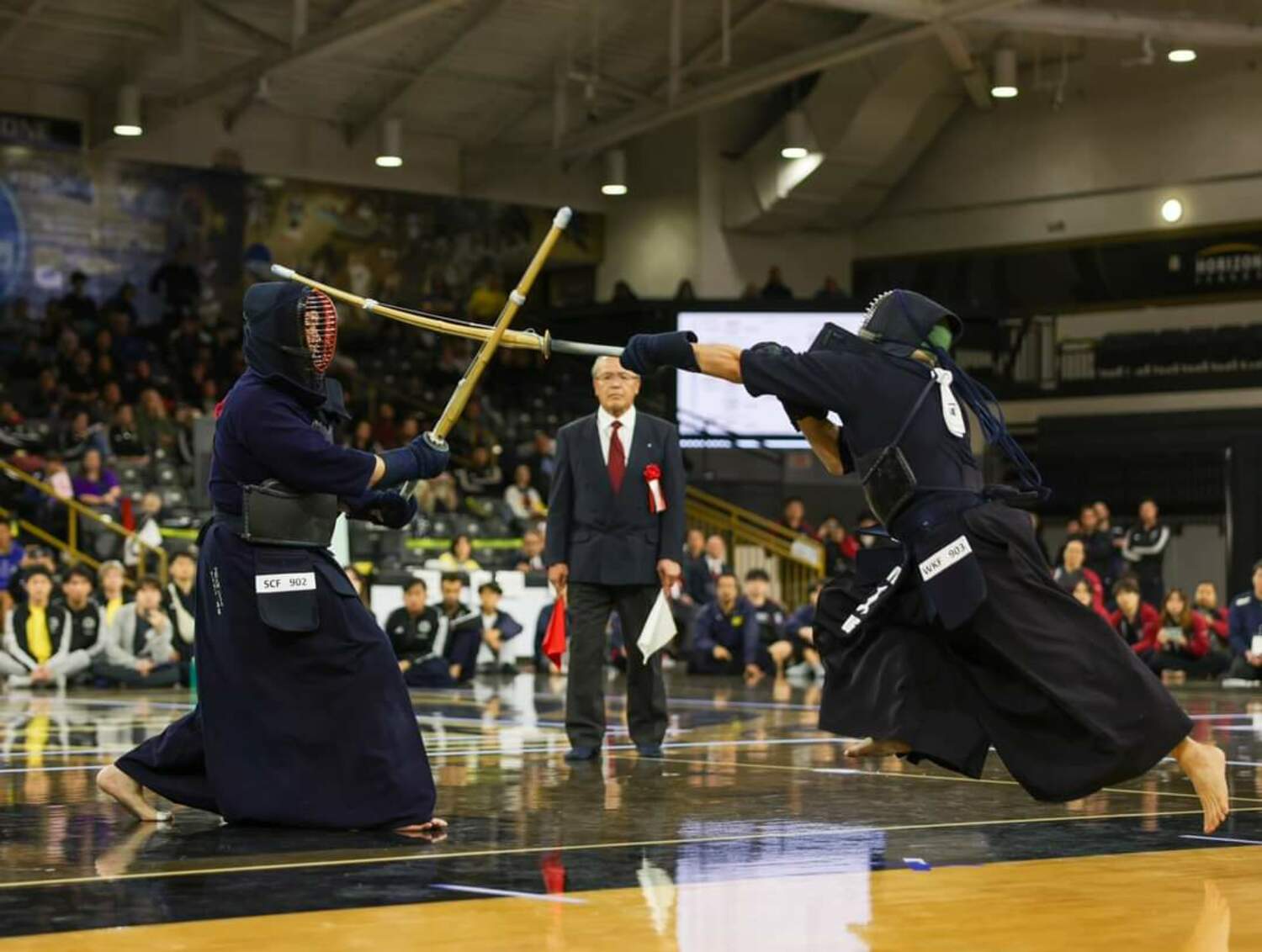
For myriad reasons, Misao Grivas was unsure if she’d ever compete in another kendo national championship.
For starters, due to the COVID-19 pandemic, the All United States Kendo Federation, the national governing body of the Japanese martial art, practiced with bamboo swords and body armor, had not held a national championship since 2017, as they hold the tournament every three years. Then in 2021, Grivas — a member of the production team at The Express News Group — suffered a severe back injury that kept her from competing for nearly a year.
But, after all that, Grivas proved she’s still got it.
After a year or so of rumors swirling that the AUSKF would bring back its national championship, it finally did, from June 30 to July 2, at the O’rena at Oakland University in Rochester, Michigan, just over 30 miles north of Detroit. Competing in the senior women’s division as Misao Kono-Grivas, she earned herself a Fighting Spirit Award by reaching the quarterfinals of her bracket and finishing “best 8.”
Grivas is no stranger to dealing with injuries, she said, undergoing knee surgery in her late 20s, a shoulder surgery more recently five years ago, and then her latest injury to her back — which affected lumbars four, five and six, including a bulging disc, herniated disc and pinched nerve — that didn’t require surgery, but did include a lengthy rehabilitation process. Included with the back injury was a kidney infection she didn’t know she had until she went to the emergency room for her back pain.
It’s good to know, she said, that after all of her injuries, and at 57 years old, she can not only still compete, but also teach and be an official and judge at the national level.
“I still can do it,” she said. “I always tell myself that.”
The Shinnecock Hills resident won her first preliminary round, or placement round, match, over Carolyn Yatomi on July 1. She then defeated Yuriko Shikai in her opening tournament match to earn her Fighting Spirit Award and reach the quarterfinals, where she lost a very tightly contest match to Stefani Lee.
Points are scored in kendo based primarily on ki-ken-tai-no-chi — spirit, sword and body, as one. Ki — Japanese for spirit or intent — is expressed by yelling out the intended target at the exact moment of the strike. Similar to calling a shot in billiards, if someone hits the wrist instead of the head, and they had intended to hit the head, the strike would not result in a point. Competitors must also strike with the proper part of the ken, or sword — in kendo a shinai (bamboo sword) — which is represented by the area between the tip and the leather tie about 25 centimeters down from the tip. The leather tie is approximately at the area known as the monouchi, or “sweet spot.” The idea is if someone was swinging an actual katana, there needs to be a compromise between blade speed and strength; too close to the tip and there’s a risk of damaging the sword. Too close to the hilt and there’s not enough speed to make a proper cut. And finally, tai, or body. If a strike hits with the proper part of the blade, and the strike is coordinated with the body’s momentum and the competitor successfully yells out his/her at the moment the strike lands, that person will have scored a point in kendo — most of the time.
As Grivas described her last match, Lee went for a head shot and just missed, as confirmed by the official on the floor right next to them. But, there are also two judges sitting off the mat, a little farther away from the action, who both thought they saw Lee’s blade graze Grivas’s head, and so they awarded her a point, even though the judge on the floor didn’t call it. It wound up being a deciding point in the match and led to the elimination of Grivas. Still, she was just happy with competing and being highly involved in the sport she’s competed in since she was 9 years old in her native Japan.
By the time Grivas immigrated to the United States from Japan, when she was around 24, she said, she was already third dan (black belt and up) in kendo. Now she’s built herself up to sixth dan — one of only 10 people in the entire U.S. at that level — and she’s got her sights set at becoming seventh dan. Grivas would only be the third person in the country to achieve that level. She’s failed the tests already a couple of times, but she’s going to continue to pursue it, she said.
Thanks to her experience in the sport, Grivas has found her fair share of success. She won her first national championship in 1993 and took third place three years later, both as an individual and as part of a team. In 2015, Grivas won the women’s individual title in the third dan division at the Eastern U.S. Kendo Championships.
Currently, Grivas both practices and teaches at Ryu Shu Kan in Farmingville and she’s also the head coach of the club kendo/kumdo team at Stony Brook University. Grivas has been teaching for years and even had her own dojo, along with her former husband, at various locations in Sag Harbor and Southampton. But now she competes and teaches exclusively at Ryu Shu Kan.
For more information on kendo and Ryu Shu Kan, visit https://sachemkarate.com/kendo.html.